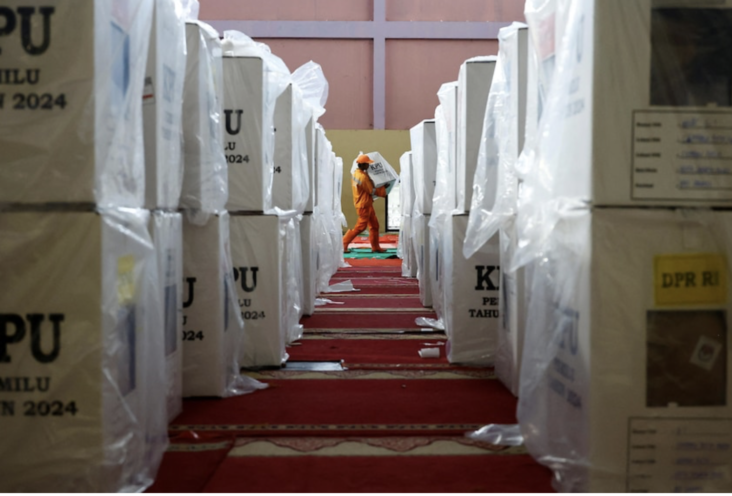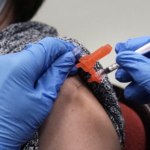
Last month, Indonesia held the world’s biggest single-day election.
But shortly after more than 204 million citizens voted in the poll won by Prabowo Subianto, the country’s health ministry reported that 115 election officials had died.
It’s not the first time officials have died, but this year Indonesia had been hoping new technology would ease the workload for staff.
What were the causes of death?
The health ministry said heart disease was the biggest cause of death.
Other causes included septic shock, hypertension and accidents.
The highest number of deaths was in officials aged 51-60 years old, but casualties also included staff under 20.
One of them was 19-year-old high school student Rhevi Kusmana.
Mr Kusmana’s father told local media he died in hospital two days after being diagnosed with heart disease.
He said his son had to stand at a polling station until 3am before going to school a few hours later to sit a test.
The health ministry said more than 15,000 election officials also turned up at hospitals, with most patients reporting digestive and respiratory issues.
Is this many deaths out of the ordinary?
Terence Hull, emeritus professor of demography at The Australian National University, said there were many factors that would need to be considered for a proper analysis but in simple terms the number did not appear unusual.
There were 5.7 million registered poll workers at more than 820,000 polling stations across the country.
“We have about six deaths per 1,000 population each year,” he said.
“So when you look at the numbers, you’ll see that it works out.”
Mr Hull also said stories about the number of deaths among poll workers came out every election because Indonesia collected this information unlike most other countries.
“If an Australian poll worker dies of a heart attack or something that’s recorded by the civil register, but it’s not recorded by the electoral commission,” he said.
“Because it’s regarded as a natural thing.”
But Mr Hull said many poll workers in Indonesia did have risky jobs.
“[Elections] take place in trying conditions and over extended periods.”
Were there fatalities in previous elections?
Almost 900 election officials died during the 2019 election, according to the General Election Commission (KPU).
The head of the KPU at the time, Arief Budiman, said workload was a major factor.
The Jakarta Post reported the toll was so high due to the number of elderly officials, and as result, this year the government banned anyone over the age of 55.
In the 2014 election, 157 officials died.
What makes the work so stressful?
NGO the Democracy and Electoral Empowerment Partnership (DEEP) said a big workload, largely caused by technical issues, led to long hours and stress.
The technical issues arose from a government plan that was actually meant to reduce workloads.
A new app called Sirekap was introduced to remove the need for officials to enter data into the election tally system manually, as had been the case in previous elections.
However, on election day the system was overwhelmed and servers failed — so staff still had to input results manually.
“What was thought to be a solution has instead become another problem,” DEEP’s executive director Neni Nur Hayati told the ABC.
“They had to upload 50 forms [of results] … on top of other workloads, which was already heavy enough. I imagine they would’ve been stressed out.”
Ms Hayati and her team randomly inspected polling stations, and found some were still operating at 6am on the day after the election.
Daffa (not his real name) said he had to work until 3am because of the faulty app.
“There were some errors with the app and other things like the data not being entered or counted accurately,” the university student said.
“So we had to repeat the same procedure over and over.”
Daffa said he was only paid $A35 to work from 6:30am on election day and didn’t receive any extra money for food.
He said he had a fever for four days after the election and that the experience wasn’t worth it.
“I hope next time they will pay attention to small things, such as giving money for food, otherwise our pay is useless,” he said.
“Also they need to pay more attention to our health.”
How is lack of sleep linked to disease?
GP Diana Maryam Leiwakabessy said chronic fatigue caused by not sleeping for extended periods could cause heart issues, and in the worst cases lead to death.
She said the risk was worse for “the elderly, or young people whose physical health isn’t good, don’t have balanced diet, or don’t exercise”.
“Or if they have comorbidities which are not known before or maybe even ignored. Not to mention if the person practices risky habits, such as smoking.”
Dr Leiwakabessy said the digestive issues that were reported by officials could have been as a result of stress.
“Stress manifests in different forms,” she said.
She said it was important to make sure staff passed health screenings.
What were the regulations around health?
The health ministry said election officials had to pass a medical check and produce a letter of fitness issued by a community health centre, hospital or clinic.
They were required to be “physically and spiritually healthy and free from any substance use”, the ministry said.
The ministry also said they would have emergency services ready on election day.
Ms Hayati said the health screening for this election was better than the previous election, but “could’ve been tighter”.
“They only assessed the external physique, not the internal,” she said.
But Daffa said a medical check wasn’t required when he signed up and that no health staff were at the polling station where he worked.
The health ministry said having health workers at all 820,000 polling stations “would be impossible”.
How have authorities responded?
The ABC approached the KPU for comment but did not receive a response.
According to local media reports, the KPU is in the process of compensating families of officials who died.
It’s understood they will be paid 36 million rupiah, or around $A3,500, as well as funeral assistance of 10 million rupiah.
What could be done better next time?
In the massive one-day election, Indonesians vote for their new president and vice-president, along with parliamentary and local representatives.
Ms Hayati from DEEP said the elections should be broken up.
“The election doesn’t have to be done simultaneously where we have to cast votes on five different ballot papers,” she said.
“Separating the national and local election and giving it a two-year gap would help relieve the workload of the election staff.”
Health ministry spokeswoman Siti Nadia Tarmizi told the ABC “good administrative training” would be given to officials ahead of the next national ballot in 2029.



